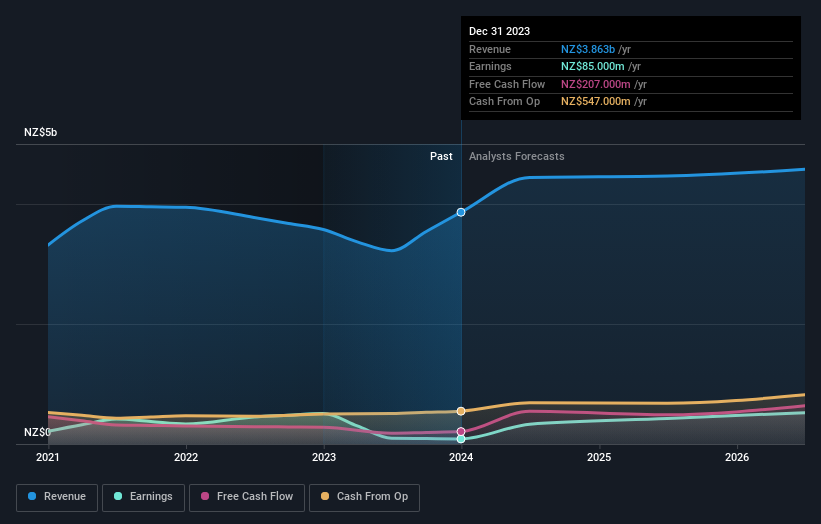key insights
-
Significant state or government control of Meridian Energy means the public has more power to influence management and governance-related decisions
-
The company's largest shareholder is New Zealand, with a 51% stake.
-
What Insiders Recently Bought
Every investor in Meridian Energy Limited (NZSE:MEL) should be aware of the most powerful shareholder groups. The state or government holds the largest stake in the company with his 51% stake. In other words, this group faces the greatest upside potential (or downside risk).
Meanwhile, retail investors have 36% ownership in the company.
Let's delve deeper into each type of owner of Meridian Energy, starting from the table below.
Check out our latest analysis for Meridian Energy.


What does institutional ownership tell us about Meridian Energy?
Many institutions measure performance based on indicators that approximate local markets. So they usually pay more attention to companies that are included in major indices.
We can see that Meridian Energy does have institutional investors. And they own a significant portion of the company's stock. This implies the analysts working for these institutions have considered the stock and they like it. But just like anyone else, they can be wrong. It is not uncommon to see a big share price drop if two large institutional investors try to sell out of a stock at the same time. So it is worth checking Meridian Energy's past earnings trajectory, (below). Of course, keep in mind that there are other factors to consider as well.


Hedge funds don't have many shares in Meridian Energy. New Zealand is currently the company's largest shareholder with 51% of outstanding shares. This means they hold a majority interest in the future of the company. On the other hand, the second and third largest shareholders hold about 1.9% of the stock and his own 1.8%.
While it makes sense to study institutional ownership data for a company, it also makes sense to study analyst sentiments to know which way the wind is blowing. There are plenty of analysts covering the stock, so it might be worth seeing what they are predicting.
Insider ownership in Meridian Energy
The definition of a company insider can be subjective and varies by jurisdiction. Our data reflects individual insiders, and at least captures board members. Management ultimately answers to the board. However, it is not uncommon for managers to be members of the board of directors. This is especially true if the manager is the founder or CEO.
I generally consider insider ownership to be a good thing. However, in some cases, it may be more difficult for other shareholders to hold the board accountable for decisions.
Our data suggests that insiders own less than 1% of Meridian Energy Limited shares in their own names. It's quite large, so we wouldn't expect insiders to own a large percentage of the shares. In total, they own NZ$9.9m worth of shares. It's always good to see at least some insider ownership, and it might be worth checking if those insiders have been selling.
Open to the public
The general public, typically retail investors, owns 36% of Meridian Energy's shares. While this group doesn't necessarily call the shots, it can certainly have a big influence on how the company is run.
Next steps:
While it is well worth considering the different groups that own a company, there are other factors that are even more important. for that purpose, two warning signs I found them at Meridian Energy (including one that was a little worrying).
after all the future is most important.You can access this free A report on analyst forecasts for a company.
Note: The numbers in this article are calculated using data from the previous 12 months and refer to the 12-month period ending on the last day of the month in which the financial statements are dated. This may not match the full year annual report figures.
Have feedback on this article? Curious about its content? contact Please contact us directly. Alternatively, email our editorial team at Simplywallst.com.
This article by Simply Wall St is general in nature. We provide commentary based on historical data and analyst forecasts using only unbiased methodologies, and articles are not intended to be financial advice. This is not a recommendation to buy or sell any stock, and does not take into account your objectives or financial situation. We aim to provide long-term, focused analysis based on fundamental data. Note that our analysis may not factor in the latest announcements or qualitative material from price-sensitive companies. Simply Wall St has no position in any stocks mentioned.


